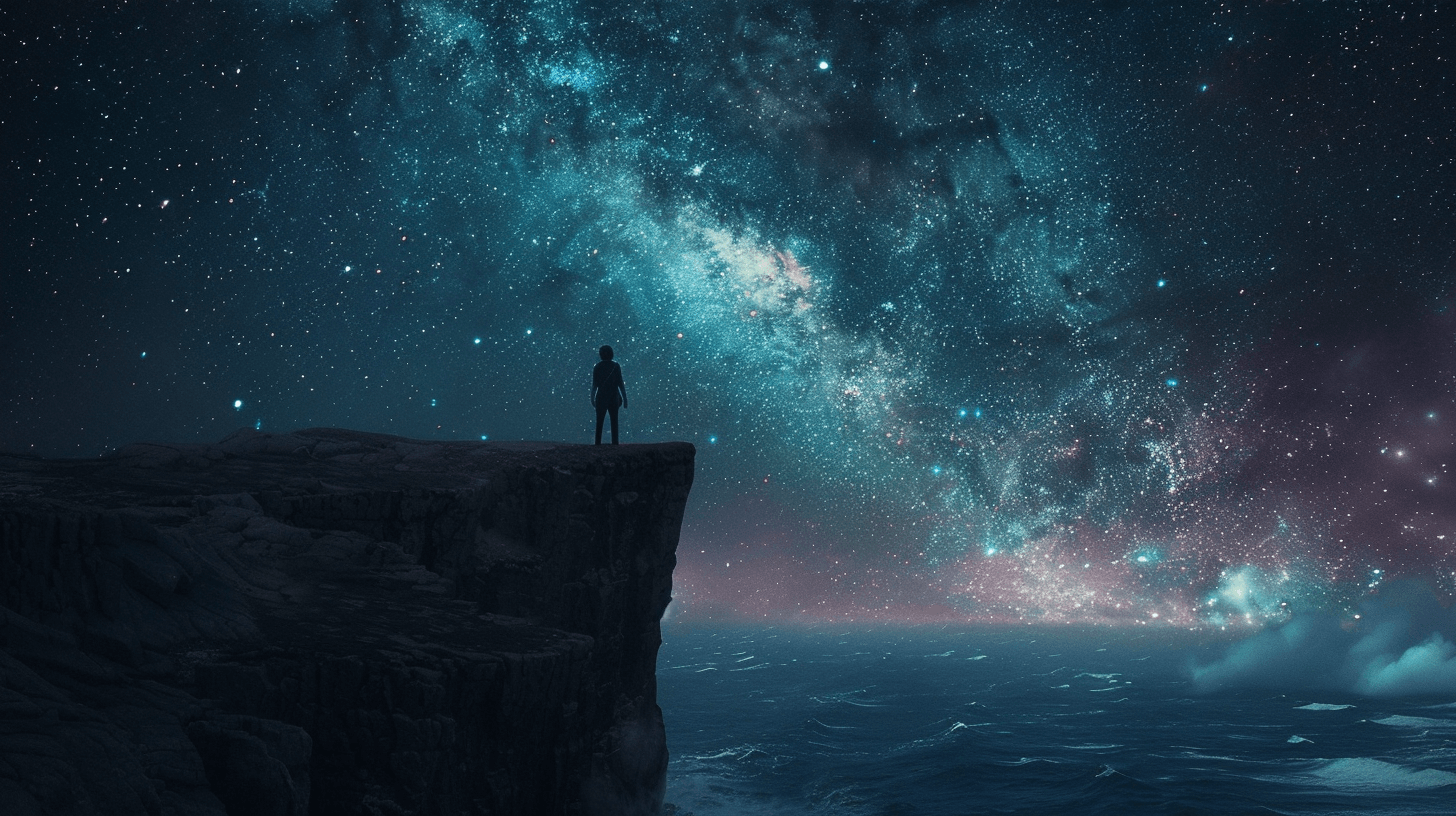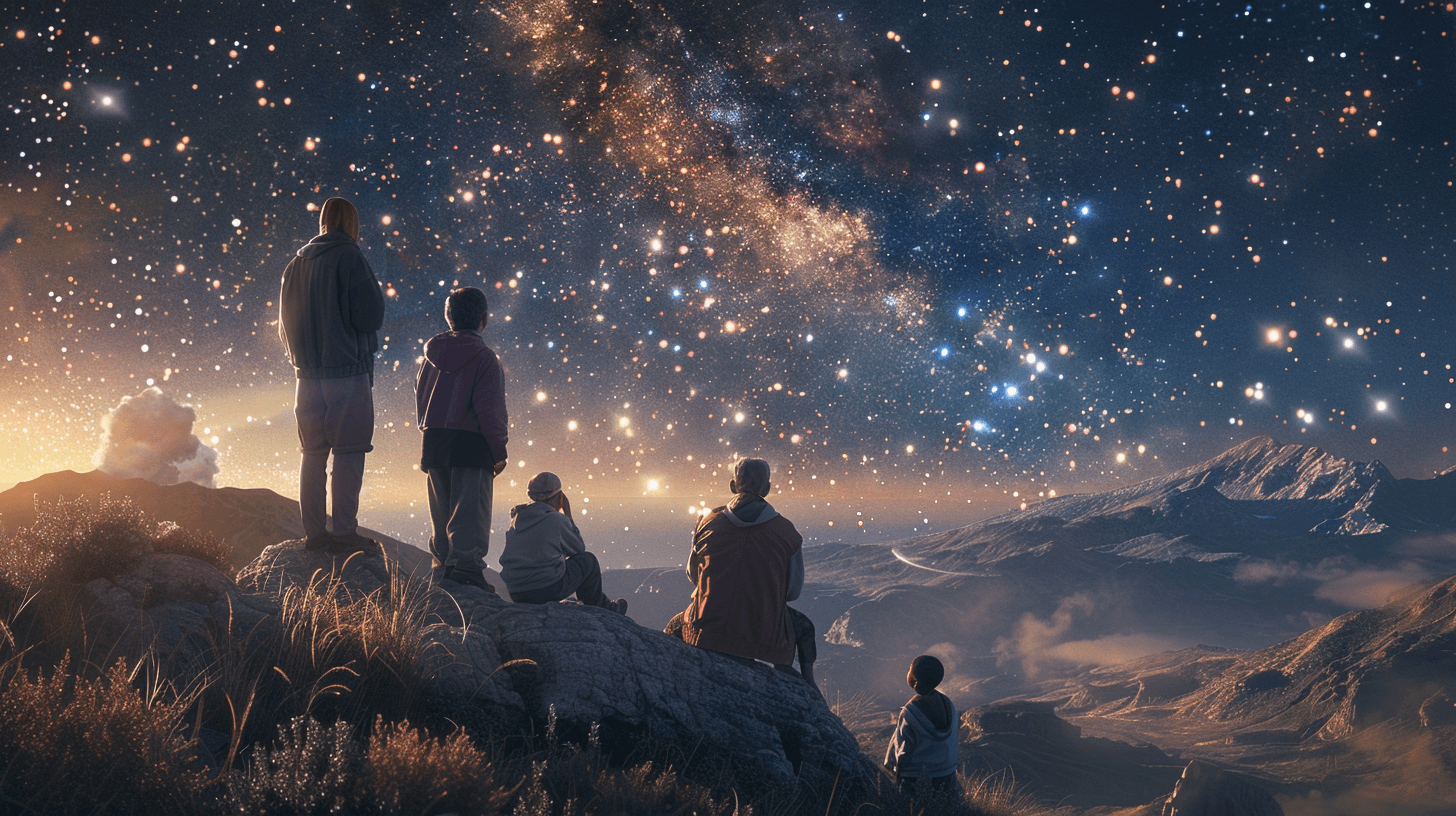Introduction: The Journey to Cosmic Understanding

In a world brimming with information and connectivity, the quest for deeper knowledge and understanding has led many to seek cosmic insights—an exploration of the universe that transcends the ordinary and ventures into the profound. But what does it mean to explore cosmic insights, and why is it essential for personal and collective growth?
At its core, exploring cosmic insights involves delving into the mysteries of the universe, seeking to understand the fundamental principles that govern existence, and contemplating our place within this vast, interconnected reality. This journey is not just about accumulating knowledge; it is about expanding consciousness, challenging preconceived notions, and integrating new perspectives into our understanding of life and the cosmos.
Books are powerful tools on this journey. They allow us to access the thoughts of great minds, explore complex ideas at our own pace, and reflect deeply on the concepts that resonate with us. This article will guide you through the process of exploring cosmic insights with books, offering profound insights, practical advice, and recommendations for those ready to embark on this transformative journey.
The Importance of Exploring Cosmic Insights

The Human Drive to Understand the Cosmos
The desire to understand the cosmos is as old as humanity itself. From ancient civilizations that gazed at the stars and created myths to explain the heavens, to modern scientists probing the depths of space with advanced technology, the quest to comprehend the universe has been a constant in human history.
This drive is rooted in a fundamental aspect of human nature: the need for meaning and connection. As we explore the cosmos, we seek to answer the most profound questions—What is the nature of reality? How did the universe come into existence? What is our role within this vast expanse? These questions are not just academic; they are deeply personal, touching on our very identity and purpose.
Exploring cosmic insights allows us to transcend the mundane and connect with something greater than ourselves. It invites us to consider the broader context of our lives, to see our experiences as part of a larger cosmic narrative, and to find meaning in the interconnectedness of all things.
The Intersection of Science, Spirituality, and Philosophy
To truly explore cosmic insights, one must approach the subject from multiple perspectives—scientific, spiritual, and philosophical. Each of these disciplines offers unique insights into the nature of the universe, and together, they provide a more comprehensive understanding.
Science: The scientific approach to cosmic exploration is grounded in observation, experimentation, and evidence. It seeks to uncover the laws that govern the universe, from the behavior of subatomic particles to the dynamics of galaxies. Through science, we gain a detailed understanding of the physical universe and the mechanisms that drive it.
Spirituality: Spirituality offers a different lens through which to view the cosmos. It emphasizes the subjective experience of connection, unity, and transcendence. While science focuses on the external, measurable aspects of reality, spirituality explores the internal, experiential dimensions—how we relate to the cosmos and what it means for our personal growth and development.
Philosophy: Philosophy bridges the gap between science and spirituality, providing a framework for understanding the implications of cosmic insights. It encourages us to ask questions about the nature of existence, the meaning of life, and the ethical considerations that arise from our understanding of the universe.
By integrating these perspectives, we can develop a holistic approach to cosmic exploration—one that honors the rigor of science, the depth of spirituality, and the wisdom of philosophy.
The Role of Books in Expanding Consciousness
Books play a crucial role in the exploration of cosmic insights. Unlike other forms of media, books allow for deep, sustained engagement with complex ideas. They provide the space for reflection, contemplation, and personal interpretation—key elements in the process of expanding consciousness.
Reading books on cosmic insights offers several unique benefits:
Access to Expertise: Books allow us to access the thoughts and insights of experts—scientists, philosophers, spiritual leaders—who have spent their lives exploring the mysteries of the universe. Through their writings, we can learn from their experiences, discoveries, and reflections.
Depth of Understanding: Books offer a level of detail and depth that is often lacking in shorter forms of media. They provide the context, background, and nuanced explanations needed to fully understand complex concepts.
Personal Reflection: Reading is an inherently reflective activity. It invites us to engage with the material on a personal level, to think critically about what we are reading, and to integrate new ideas into our worldview.
In the following sections, we will explore some of the most impactful books on cosmic insights, offering recommendations and insights that will help you on your journey of cosmic exploration.
Top Books to Explore Cosmic Insights

“Cosmos” by Carl Sagan
Summary: Carl Sagan’s “Cosmos” is a seminal work that explores the wonders of the universe through the lens of science and philosophy. Sagan takes readers on a journey through space and time, revealing the intricate connections between life on Earth and the vast cosmos that surrounds us.
Key Takeaways:
The Vastness of the Cosmos: Sagan emphasizes the incredible scale of the universe, helping readers grasp the immensity of space and the relative smallness of our planet. This perspective fosters a sense of humility and awe.
The Interconnectedness of Life: Sagan explores the idea that life on Earth is deeply connected to the cosmos, both in terms of its origins and its future. He discusses the possibility of life beyond Earth and the implications of our place in the universe.
The Importance of Scientific Understanding: Sagan argues that scientific knowledge is essential for understanding the universe and making informed decisions about the future of humanity.
Why It’s Essential: “Cosmos” serves as a foundational text for anyone interested in exploring cosmic insights. Sagan’s ability to communicate complex scientific concepts in an accessible and engaging way makes this book a must-read for those seeking to expand their understanding of the universe.
“The Holographic Universe” by Michael Talbot
Summary: Michael Talbot’s “The Holographic Universe” presents the theory that the universe might be a vast hologram—a projection of a deeper, underlying reality. Talbot explores the implications of this theory for our understanding of reality, consciousness, and the interconnectedness of all things.
Key Takeaways:
Reality as a Hologram: Talbot suggests that the physical world is a projection of a more fundamental reality, much like a hologram. This idea challenges conventional notions of space, time, and matter.
The Interconnectedness of Consciousness: Talbot explores the idea that consciousness is not confined to individual minds but is a fundamental aspect of the universe itself. He discusses phenomena such as telepathy, out-of-body experiences, and synchronicity as evidence of this interconnected consciousness.
The Potential for Personal Transformation: Talbot argues that understanding the holographic nature of reality can lead to profound personal transformation, as it opens up new possibilities for how we perceive and interact with the world.
Why It’s Essential: “The Holographic Universe” challenges conventional perceptions of reality and offers a new framework for understanding the universe and our place within it. This book is essential for readers interested in exploring the boundaries of science and metaphysics.
“The Hidden Reality” by Brian Greene
Summary: In “The Hidden Reality,” Brian Greene explores the concept of parallel universes and the deep laws of the cosmos that suggest the existence of multiple realities beyond our observable universe. Greene delves into the scientific theories that support the idea of a multiverse, including string theory, quantum mechanics, and inflationary cosmology.
Key Takeaways:
The Multiverse: Greene introduces readers to the concept of the multiverse—a collection of parallel universes that exist alongside our own. He explains the scientific theories that suggest the possibility of these alternate realities.
The Implications for Reality: The idea of a multiverse challenges our understanding of reality, suggesting that what we perceive as the “real world” is just one of many possible realities.
The Intersection of Science and Philosophy: Greene discusses the philosophical implications of the multiverse, including questions about free will, determinism, and the nature of existence.
Why It’s Essential: “The Hidden Reality” is crucial for readers interested in the cutting-edge theories of modern physics and their implications for our understanding of the cosmos. Greene’s ability to explain complex scientific concepts in an accessible way makes this book a valuable resource for anyone seeking to explore the mysteries of the universe.
“The Tao of Physics” by Fritjof Capra
Summary: “The Tao of Physics” by Fritjof Capra draws parallels between Eastern mysticism and modern physics, suggesting that the insights of ancient spiritual traditions are reflected in the discoveries of contemporary science. Capra explores how the concepts of quantum physics, relativity, and particle physics resonate with the teachings of Taoism, Buddhism, and Hinduism.
Key Takeaways:
The Unity of Science and Spirituality: Capra argues that the fundamental principles of modern physics echo the spiritual insights of Eastern traditions, suggesting a unified understanding of the universe.
The Interconnectedness of All Things: Both physics and mysticism emphasize the interconnectedness of all things, challenging the notion of separate, independent entities. Capra explores how this idea is reflected in both quantum physics and spiritual teachings.
The Limitations of Western Thought: Capra critiques the reductionist approach of Western science, advocating for a more holistic understanding of reality that integrates both scientific and spiritual perspectives.
Why It’s Essential: “The Tao of Physics” is pivotal for readers who seek to bridge the gap between scientific inquiry and spiritual exploration. Capra’s insights offer a holistic view of cosmic reality, making this book essential reading for those interested in the intersection of science and spirituality.
“The Field” by Lynne McTaggart
Summary: Lynne McTaggart’s “The Field” explores the idea of a universal energy field that connects all life, drawing on research from quantum physics, consciousness studies, and the paranormal. McTaggart presents the concept of “The Field” as a fundamental force that underlies reality and influences everything from human health to global consciousness.
Key Takeaways:
The Universal Energy Field: McTaggart introduces the idea of a universal energy field that permeates all of existence, suggesting that this field is the foundation of reality and consciousness.
The Power of Intention: McTaggart explores the role of human intention in shaping reality, drawing on studies that suggest our thoughts and intentions can influence physical matter and events.
The Interconnectedness of Life: “The Field” emphasizes the interconnectedness of all life, suggesting that we are all part of a greater whole and that our actions have far-reaching effects on the world around us.
Why It’s Essential: “The Field” offers a fresh perspective on the interconnectedness of all things, making it essential reading for those seeking to understand the deeper forces at play in the cosmos. McTaggart’s exploration of the relationship between consciousness and reality challenges conventional thinking and opens up new possibilities for understanding the universe.
How to Choose the Right Book for Your Cosmic Exploration

Before diving into the vast ocean of cosmic insights, it’s important to assess your current level of understanding and your specific interests. Are you drawn to the scientific aspects of cosmic exploration, or are you more interested in the philosophical and spiritual dimensions? Understanding your starting point will help you choose a book that aligns with your current knowledge and curiosity.
Beginner: If you are new to cosmic exploration, consider starting with books that provide a broad overview of the universe and its mysteries, such as Carl Sagan’s “Cosmos.” These books offer accessible explanations of complex concepts, making them ideal for those just beginning their journey.
Intermediate: If you have some background knowledge and are looking to deepen your understanding, consider books that explore specific theories or concepts in more detail, such as “The Hidden Reality” by Brian Greene or “The Holographic Universe” by Michael Talbot.
Advanced: For those with a strong foundation in cosmic insights, consider books that challenge conventional thinking and offer new frameworks for understanding reality, such as “The Tao of Physics” by Fritjof Capra or “The Field” by Lynne McTaggart.
Balancing Scientific Rigor with Spiritual Exploration
One of the challenges of exploring cosmic insights is finding the right balance between scientific rigor and spiritual exploration. Some books lean heavily on scientific evidence and theories, while others focus more on spiritual and philosophical interpretations. When choosing a book, consider your own preferences and what you hope to gain from the experience.
Scientific Rigor: If you are interested in the scientific aspects of cosmic exploration, look for books that are grounded in research and evidence. These books will provide a solid understanding of the physical universe and the laws that govern it.
Spiritual Exploration: If you are drawn to the spiritual dimensions of cosmic insights, consider books that explore the experiential and philosophical aspects of the cosmos. These books often emphasize the interconnectedness of all things and the role of consciousness in shaping reality.
Balanced Approach: Some books, such as “The Tao of Physics,” offer a balanced approach that integrates both scientific and spiritual perspectives. These books can provide a holistic understanding of the universe, making them ideal for readers who appreciate both evidence-based and experiential insights.
Considering the Author’s Perspective
The perspective and background of the author can greatly influence the content and approach of a book on cosmic insights. When choosing a book, consider the author’s expertise, worldview, and the lens through which they view the universe.
Scientists: Books written by scientists, such as “Cosmos” by Carl Sagan or “The Hidden Reality” by Brian Greene, often focus on the empirical evidence and theories that explain the physical universe. These authors bring a wealth of knowledge and a commitment to scientific rigor.
Philosophers: Books written by philosophers may explore the ethical, existential, and metaphysical implications of cosmic insights. These authors often provide a deeper understanding of the implications of scientific discoveries for our understanding of reality.
Spiritual Leaders: Books written by spiritual leaders or those with a spiritual focus, such as “The Tao of Physics” by Fritjof Capra or “The Field” by Lynne McTaggart, often emphasize the interconnectedness of all things and the role of consciousness in the universe. These authors provide insights that resonate with those seeking a more holistic and integrated understanding of the cosmos.
Personal Resonance
Ultimately, the most important factor in choosing a book on cosmic insights is personal resonance. The book you choose should speak to your current questions, challenges, and aspirations. It should resonate with your inner sense of curiosity and wonder, inviting you to explore new ideas and expand your understanding of the universe.
Intuition: Trust your intuition when choosing a book. If a particular book calls to you, even if it’s outside your usual interests, consider giving it a try. Sometimes the most unexpected books can offer the most profound insights.
Relevance: Consider how the book aligns with your current goals and interests. Are you looking for practical applications of cosmic insights, or are you more interested in theoretical explorations? Choose a book that aligns with your intentions for cosmic exploration.
Challenge: Don’t be afraid to choose a book that challenges your current beliefs or pushes you out of your comfort zone. Cosmic exploration is about expanding consciousness, and sometimes that requires confronting new and challenging ideas.
Integrating Cosmic Insights into Daily Life

Reflecting on Cosmic Concepts
One of the most powerful ways to integrate cosmic insights into your daily life is through reflection. Reflecting on the concepts you encounter in your reading allows you to internalize these ideas and consider their implications for your own life and worldview.
Journaling: Keep a cosmic insights journal where you record your thoughts, reflections, and questions as you explore new ideas. This practice helps solidify your understanding and provides a space for personal contemplation.
Meditation: Use meditation to deepen your connection with cosmic concepts. After reading about a particular idea, such as the interconnectedness of all things, spend time in meditation focusing on that concept and how it manifests in your life.
Discussion: Engage in discussions with others who are also exploring cosmic insights. Sharing your thoughts and hearing different perspectives can help clarify your understanding and introduce you to new ideas.
Applying Cosmic Insights to Personal Growth
Cosmic insights have the potential to inspire profound personal transformation. By applying these insights to your daily life, you can cultivate greater self-awareness, a deeper sense of purpose, and a more meaningful connection to the universe.
Mindful Living: Incorporate the principles of cosmic insights into your daily routine. For example, if you’ve been exploring the concept of interconnectedness, practice mindfulness in your interactions with others, recognizing the impact of your actions on the broader web of life.
Purpose and Meaning: Reflect on how your understanding of the cosmos influences your sense of purpose. How can you align your actions with the deeper truths you’ve discovered? Consider setting intentions or goals that reflect your expanded perspective.
Gratitude and Wonder: Cultivate a sense of gratitude and wonder as you explore cosmic insights. Recognizing the vastness and beauty of the universe can inspire a deep appreciation for life and a commitment to living with purpose and intention.
Bridging the Gap Between Science and Spirituality
One of the most enriching aspects of exploring cosmic insights is the opportunity to bridge the gap between science and spirituality. By integrating these perspectives, you can develop a more cohesive and holistic understanding of the universe.
Exploring Philosophical Implications: Consider the philosophical implications of scientific discoveries. How do these findings challenge or reinforce your spiritual beliefs? Use these reflections to deepen your understanding of both science and spirituality.
Engaging in Spiritual Practices: Integrate spiritual practices that resonate with cosmic principles, such as meditation, mindfulness, or ritual. These practices can help you embody the insights you’ve gained and create a deeper connection with the cosmos.
Creating a Unified Worldview: Strive to create a worldview that honors both the scientific and spiritual dimensions of reality. Recognize that these perspectives are not mutually exclusive but can complement and enrich each other, providing a fuller understanding of the cosmos.
Inspiring Action Through Cosmic Awareness
Understanding the vastness and interconnectedness of the cosmos can inspire meaningful action in your life. Whether through environmental stewardship, ethical living, or contributing to the greater good, cosmic insights can motivate you to make a positive impact on the world.
Environmental Stewardship: Recognize the interconnectedness of all life and take action to protect the environment. This might involve adopting sustainable practices, supporting conservation efforts, or advocating for policies that protect the planet.
Ethical Living: Let your cosmic insights guide your ethical decisions. Consider how your actions affect others and the broader world, and strive to live in a way that reflects your values and respects the interconnectedness of all things.
Contributing to the Greater Good: Use your understanding of the cosmos as motivation to contribute to the greater good. Whether through volunteer work, activism, or simply being a positive influence in your community, let your cosmic awareness inspire you to make a difference.
Resources for Further Cosmic Exploration

For those eager to continue exploring cosmic insights, here are additional books that delve into various aspects of cosmic exploration, including works on cosmology, metaphysics, and consciousness studies:
“The Elegant Universe” by Brian Greene: A deep dive into string theory and the quest for a unified theory of everything, offering insights into the fundamental nature of reality.
“The Seat of the Soul” by Gary Zukav: An exploration of the soul’s journey and the spiritual aspects of human experience, providing a bridge between personal growth and cosmic understanding.
“The Cosmic Serpent” by Jeremy Narby: A unique exploration of the connections between shamanism, DNA, and the origins of knowledge, challenging conventional views of science and spirituality.
Online Courses and Lectures
Cosmology and Consciousness: Explore online courses that delve into the relationship between cosmology and consciousness, offered by institutions like Coursera, edX, or specialized spiritual centers.
Philosophy of Science: Consider courses that explore the philosophical implications of scientific discoveries, such as the nature of reality, the ethics of exploration, and the intersection of science and spirituality.
Spirituality and Science Seminars: Attend seminars or webinars that focus on the integration of spirituality and science, providing a platform for learning and discussion with experts in the field.
Communities and Discussion Groups
Online Forums: Join online communities like Reddit’s r/space or r/spirituality, where you can engage with others interested in cosmic exploration and share your insights and experiences.
Local Meetups: Use platforms like Meetup.com to find local groups that gather to discuss cosmic insights, explore spiritual practices, or engage in philosophical debates.
Spiritual Study Groups: Consider joining or forming a study group focused on cosmic insights, where you can read and discuss books, share reflections, and support each other’s spiritual growth.
Podcasts and Documentaries
Podcasts: Listen to podcasts like “The Infinite Monkey Cage” or “On Being” that explore cosmic themes, science, and spirituality from different perspectives.
Documentaries: Watch documentaries like “The Universe” or “What the Bleep Do We Know?” that offer visual and narrative explorations of cosmic insights, providing both educational content and inspiration.
Conclusion: Embarking on a Journey of Cosmic Exploration

The journey of exploring cosmic insights is not just about acquiring knowledge; it is about expanding your consciousness, deepening your understanding of the universe, and transforming your perspective on life. By engaging with the books, practices, and resources discussed in this article, you are opening yourself up to new dimensions of thought and experience.
As you embark on this journey, remember that the exploration of cosmic insights is a deeply personal and evolving process. It requires curiosity, openness, and the courage to challenge old beliefs and embrace new ones. The insights you gain will shape your worldview, guiding you toward greater self-awareness, inner peace, and a more meaningful connection to the cosmos.
Take the first step today by choosing a book that resonates with you, reflecting on its teachings, and integrating the insights into your daily life. As you do so, you will discover that the journey of cosmic exploration is not just about seeking new ideas but about finding deeper truths that resonate with your soul and enrich your life.







